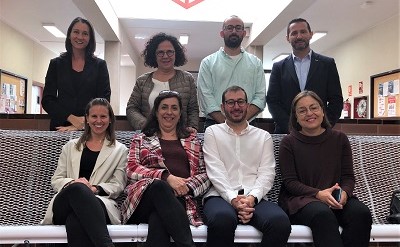- Through expressions of interest, or 'microprojects,' we are committed to encouraging research in areas that can support Cepsa's lines of action
- The Energy Research Center and ULL's research groups came together for a working session
The participating research groups from ULL were TyRA ("Water Treatment and Reuse"), CAHE ("Heterogeneous Catalysis"), MACERPICOS ("Ceramic Materials and Solid Oxide Fuel Cells"), and CSEL ("Surface Science and Electrocatalysis"). In addition, the academic institution presented the equipment from its Research Support Service (SEGAI).
The workshop also served to announce the results of the first grants of the Fundación Cepsa Chair of the University of La Laguna for expressions of interest, considered as 'microprojects,' aimed at promoting research related to the energy transition, which have had four winners.
The director of the Chair, Elena Pastor, highlighted the importance of the meeting, which "although it had already been held on previous occasions, was special because it made it possible to make visible the first call for expressions of interest, which are a good starting point to encourage research and open doors, working as a kind of exploration."
For her part, the director of the Cepsa Research Center, Joana Frontela, emphasized during the workshop that "this type of meeting between the company and the University is an opportunity to establish links and look for meeting points, and explained that both the projects presented by the participating research groups and the winning expressions of interest are in line with the new energy strategy," which emphasizes decarbonization and sustainable mobility.
She explained that this approach has gone hand in hand with a reorganization of Cepsa's R&D department through the strengthening of innovation, "an area in which the four microprojects highlighted in this first call could generate initiatives of interest to the company." She also emphasized that projects related to recycling, remediation, incorporating new products, or using elements no longer in use are of great interest to Cepsa.
Four outstanding microprojects
The first of the microprojects or expressions of interest highlighted in the first call of this competition within the Chair was entitled 'Determination of emerging contaminants in wastewater from Tenerife using automated extraction techniques' by the principal investigator Javier González Sálamo. Focused on the analysis of the Northeast wastewater treatment plant in Valle de Guerra (Tenerife), aims to guarantee water resources by reusing wastewater in the sites where there is a threat of deficit. To this end, the commitment is to monitor emerging contaminants in light of population growth and the use of an automated system for solid-phase extraction..
Another of the microprojects is 'Promotion of the circular economy in the Canary Islands through the selective CO2 capture and recovery with new porous materials derived from biopolymers from industrial waste,' by David Díaz and Sebastián Bonnardd. This initiative aims to capture carbon dioxide with photoactive nanostructures to transform it into fuel and molecules, taking advantage of the presence of polymers in industrial activity.
For its part, 'Recovery of expired drugs,' by Teresa Abad, focuses on these products as emerging contaminants with carcinogenic effects that produce antimicrobial resistance, among other aspects, that reach water and soil through wastewater treatment plants or landfills.
Along these lines, this project advocates for raising awareness of the contamination caused by expired drugs and, in turn, taking advantage of their potential through chemical recycling, isolating the active ingredients for chemical manipulation, with the resulting economic recovery.
Finally, the microproject 'Evaluation of the safety of by-products from the banana sector for their recovery using green analytical protocols,' by Bárbara Socas and Antonio Vicente Herrera, highlights the importance of recovering by-products derived from banana cultivation, such as leaves and pseudostems, as an alternative to diversify a sector that is facing an inflationary scenario, in addition to the problems it is going through after COVID-19 and the volcanic eruption in La Palma.
The project proposes an alternative approach to analyzing contaminants in these banana by-products that will make it possible to promote the product. The design of new solvents and nanomaterials for use in extraction and design procedures and the development of methodologies for determining pesticides in banana by-products with green extraction procedures and advanced analytical techniques are some of the aspects considered. This is in addition to the validation of the analytical methodologies developed and the dissemination of the results.

